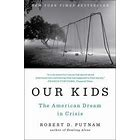Democracy requires a
thick, independent civil society. Democracy is a fraud when restrictions are
placed on churches, when unions are really fronts for the government or the
company, when self-supporting newspapers and other media succumb to mega-forces
and when there is only one viable political party. It is likewise difficult to
impose genuine democracy in a place that does not traditionally have networks
of autonomous groups.
The benefits
of civil society are multiple. It is through participation in middle-range
groups that citizens practice the arts of public life. Further, individuals
buffered by civic groups do not have to come directly up against bureaucratic
forces like a cable TV provider, a health insurance company or a large
government agency.
A small
group fulfills two needs--the need to belong and the need to make a difference.
Now, some groups are mostly about belonging. And, some groups are almost
entirely focused on external action. But the healthy group addresses both
conviviality and mission, even if one or the other element is but a pinch of
the group’s activity. A healthy group welcomes each member and misses them when
they are gone. A healthy group gives each member an opportunity to accomplish
something in the world that they could not do on their own.
Democracy
flourishes when an individual belongs to three or six or twelve different
groups. As members circulate, they bring the needs or interests of one group to
the attention of another. And the multiplicity of groups diffuses any dangerous
passion that arises when one group dominates.
In that
regard it must be quickly noted that a genuine small group aims toward the
common good. The Boogaloo Boys and the Proud Boys do not qualify as part of
civil society.
Boogaloo boys
Democracy is a main achievement of modernity. But modernity is accompanied with dissatisfactions born of the emphasis on individual liberty. Emile Durkheim (1858-1917), to mention an example, seeing the downside of excessive liberty, founded the discipline of sociology. Its concern is the loss of community in our modern society. Extreme autonomy, as it turns out, makes for ragged individuals.
By several measures alienation is getting worse. Harvard University professor Robert Putnam tracks participation in civic groups from the 1890s through today. His books, including Bowling Alone (2000) and Our Kids (2015), approach the topic from multiple angles. He finds a precipitous decline in the number of people who belong to all manner of groups and a decline in the hours they devote to such groups. Proceed with caution if you dispute Putnam’s analysis because he has crunched every statistic imaginable.
Why the decline? It is not because of common assumptions like more women in the workplace. In fact, Putnam finds, employed women are more likely than others to belong to school boards, church committees and the like. There is, he discovers, a strong inverse relation between hours spent in front of a screen and hours devoted to civic groups.
The loss
of strong mediating groups and thus the precariousness of democracy is not so
much about politics as it is culture. Zygmunt Bauman (1925-2017) calls ours a liquid culture. It adapts its shape, its
so-called values and its institutions
to circumstances and trends. Our culture is quick to propose short-term remedies
to malaise. Among the false resolutions of our unease are celebrity gossip,
excessive consumer choices, one-off relationships, New Age fads, negative
protest movements and short-lived attempts to turn back the clock.
A sense
of community cannot be restored all-at-once by a solitary individual. But glue
can be applied two-by-two. The tool is relational appointments that gradually
form a culture of encounter. It is tempting to think that if people would just
talk to neighbors, porch to porch that community would occur. But the remedy,
though it feels strange at first, is at once new and old. The solution is like
an art form; sitting with another for a half hour or 50 minutes, reverently
listening to the other’s interests. Then, in time, a relational person
introduces the interests of one public friend to another.
It is
happening among a small number of leaders who are tired of narrowly-focused
electoral campaigns and are experimenting with deep canvassing. With awkwardness they make appointments in a precinct
only to listen and then to share part of their own story—five, eight or maybe
more appointments a week. There are church members who do something similar,
meeting with members of those in other denominations. There are some young
union activists who go beyond standard spiels about wages and meet for a
listening session with consumers, stakeholders and non-union members.
Democracy
will survive and thrive to the extent that people turn off their TV and mobile
device and exercise some calculated vulnerability in relational encounters,
week after week.
Droel
edits INITIATIVES (PO Box 291102, Chicago, IL 60729), a newsletter on faith and
work.



.JPG)



.jpg)
.jpg)









